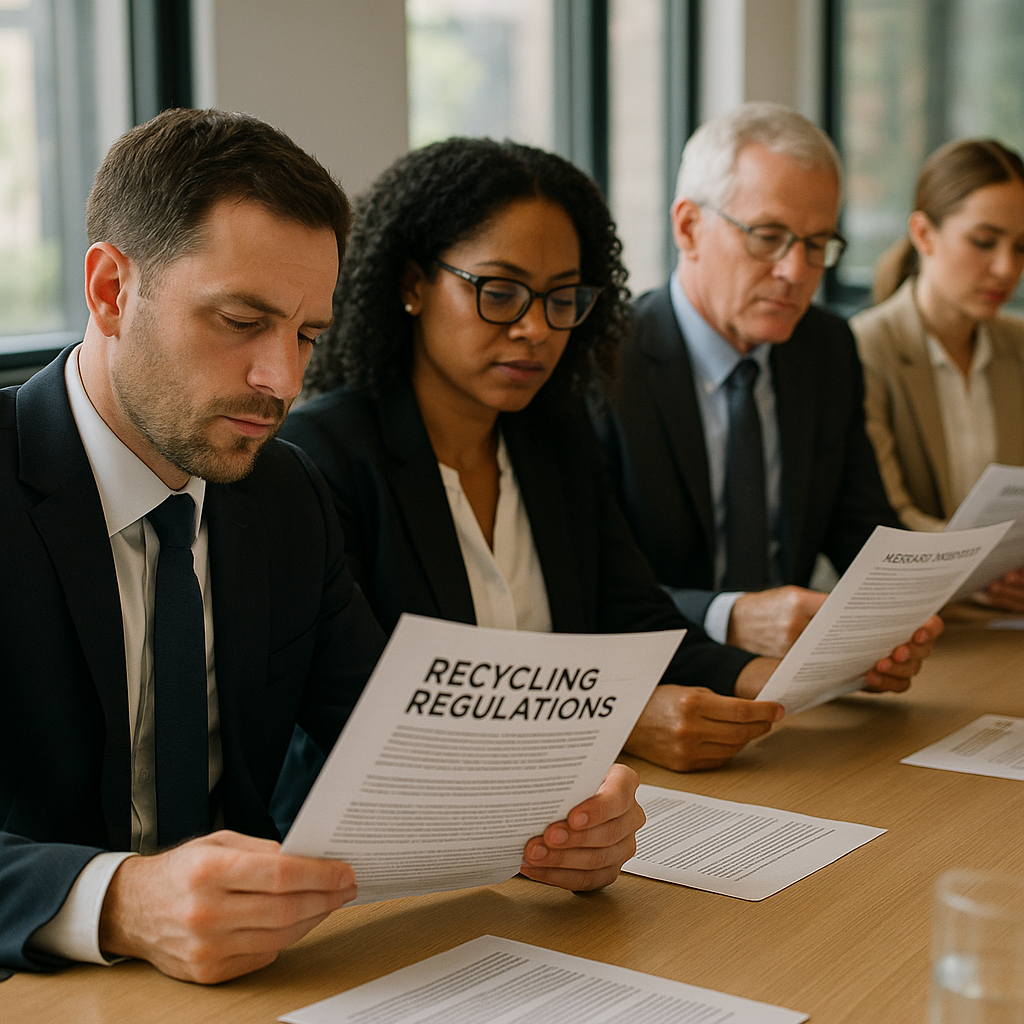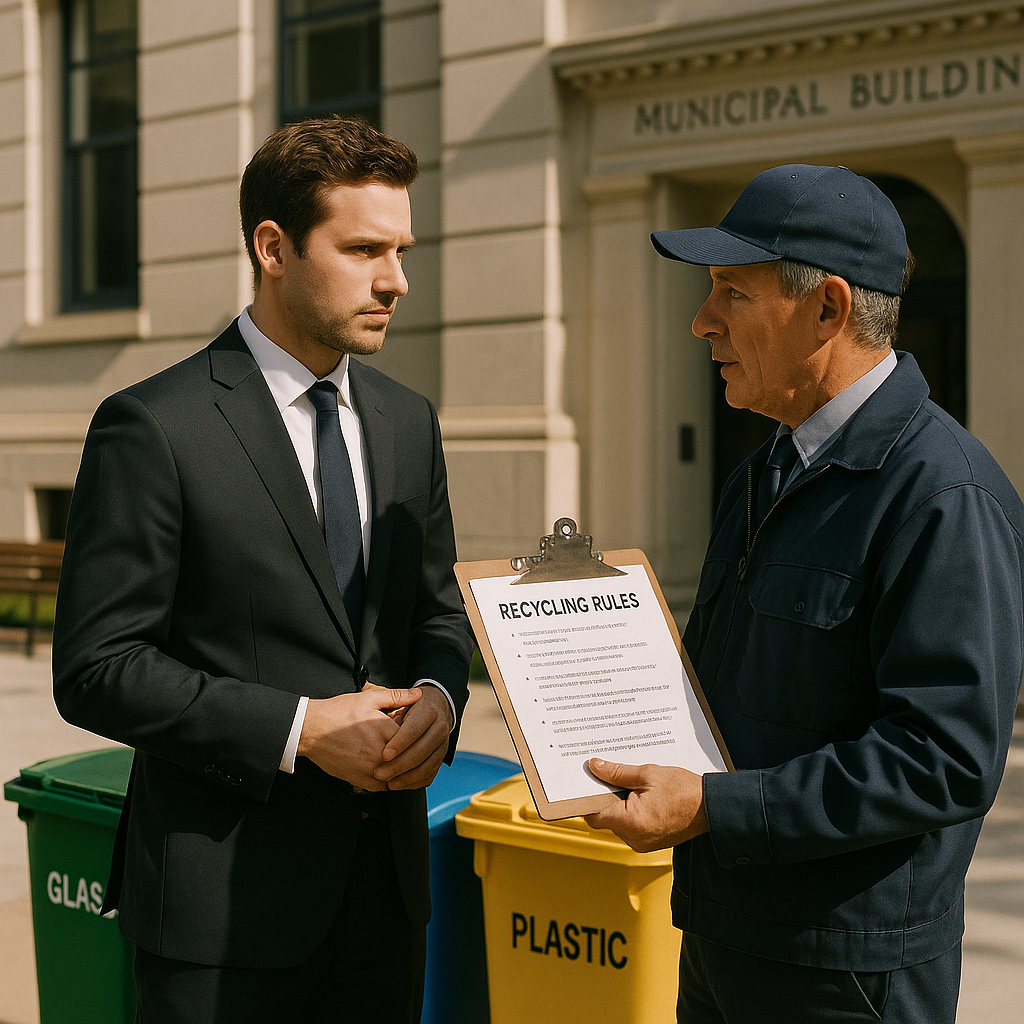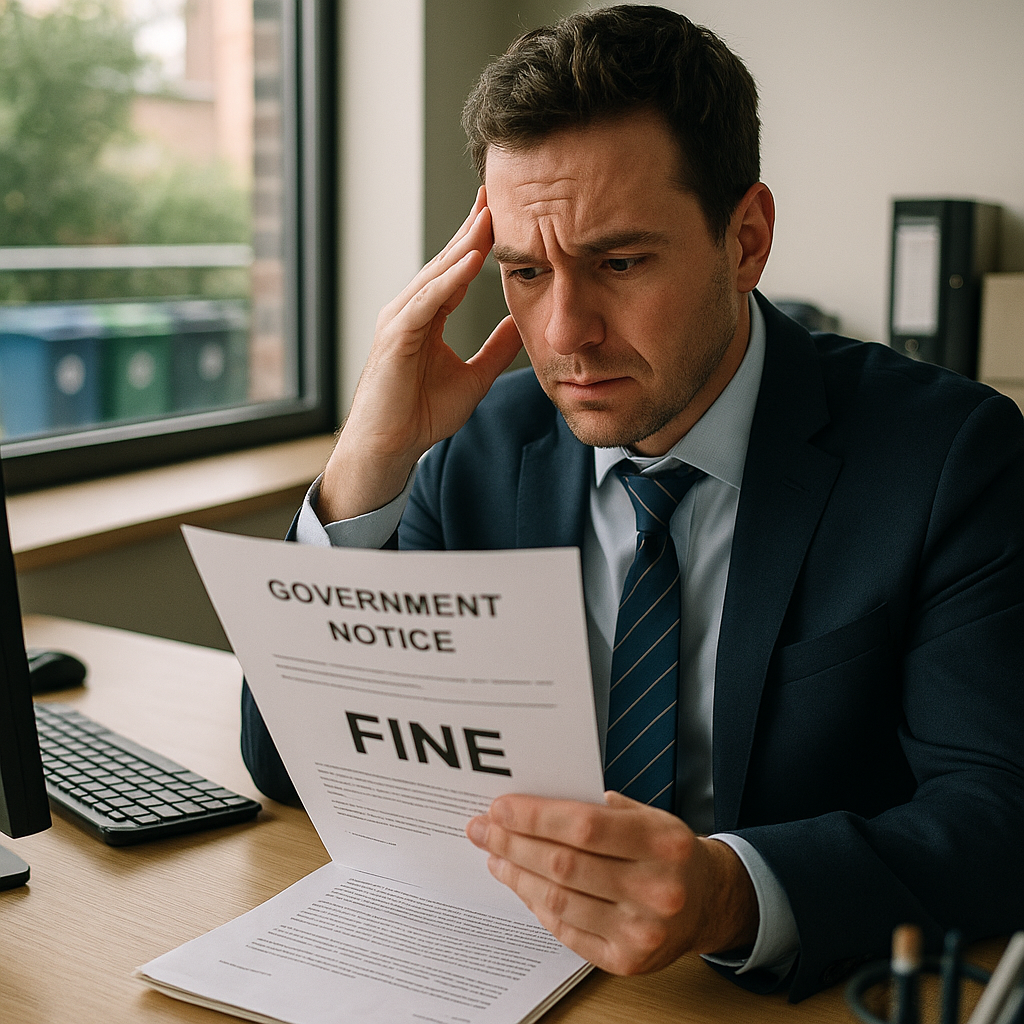5901 Botham Jean Blvd, Dallas, TX 75215
What Are the Key Legal Requirements for Business Recycling?
July 19, 2025The regulatory landscape for business recycling in the United States involves multiple levels of government. Companies today navigate a complex array of overlapping requirements, making an understanding of these regulations essential for legal compliance and environmental responsibility.
At the federal level, the Resource Conservation and Recovery Act (RCRA) serves as the foundation for waste management regulations. Established to ensure the safe handling of solid and hazardous waste, this framework grants the EPA authority to manage waste from generation to disposal through ‘cradle-to-grave’ oversight. Although the RCRA primarily focuses on hazardous waste handling, it provides the baseline structure for all waste management practices across the country.
State-level requirements add another layer of complexity. Currently, 25 states have implemented mandatory recycling laws. These regulations typically cover common materials like cardboard, paper, plastics, glass containers, and aluminum cans. States such as California and New York often lead with requirements more stringent than federal standards. For example, California’s Electronic Waste Recycling Act established a comprehensive system for collecting and recycling electronic waste, a model that 24 other states later adopted.
How Do Federal Recycling Regulations Impact Businesses?

The Resource Conservation and Recovery Act (RCRA) is the cornerstone of federal waste management regulations in the United States. This legislation grants the Environmental Protection Agency (EPA) extensive authority to oversee waste from its creation to disposal. For businesses of all sizes, RCRA establishes compliance requirements that influence daily operations.
Under RCRA, the EPA enforces a “cradle-to-grave” tracking system for hazardous waste. Businesses generating hazardous materials must follow strict protocols from creation to final disposal, including obtaining identification numbers, preparing documentation, and ensuring waste reaches approved treatment, storage, and disposal facilities.
Businesses must determine if they generate hazardous waste based on RCRA’s specific characteristics. Materials classified as ignitable, corrosive, reactive, or toxic are deemed hazardous, triggering compliance requirements. For instance, a manufacturing company producing chemical byproducts must assess these materials against EPA criteria to determine handling protocols.
Permit Requirements and Facility Inspections
Facilities that treat, store, or dispose of hazardous waste face stringent RCRA regulations. Such facilities must obtain permits through a detailed application process demonstrating safety measures, containment systems, and emergency protocols. The EPA routinely inspects these facilities to ensure compliance.
Even companies not directly handling hazardous waste feel the impact of these regulations through increased service costs and documentation requirements when using third-party waste management vendors. For example, a retail business must ensure its waste hauler properly disposes of fluorescent bulbs containing mercury, maintaining appropriate documentation for potential EPA review.
Enforcement and Penalties
The EPA possesses significant enforcement power to ensure compliance with federal recycling regulations. Non-compliance can lead to substantial penalties, with fines potentially reaching millions for serious violations. In 2022, Walmart agreed to pay $7.5 million to settle a lawsuit over improper disposal of hazardous waste, illustrating the serious consequences of regulatory violations.
Beyond financial penalties, businesses may face operational restrictions, mandatory facility upgrades, or even criminal charges for willful violations. The reputational damage from public enforcement actions can harm customer relationships and investor confidence, leading to long-lasting impacts beyond immediate penalties.
The Pollution Prevention Act‘s Impact
Alongside RCRA, the Pollution Prevention Act shifts the focus from waste management to waste reduction. It encourages businesses to adopt source reduction strategies—preventing waste creation rather than managing it post-production. The Act promotes a hierarchy of waste management practices, prioritizing source reduction, followed by recycling, treatment, and disposal.
This translates into incentives for businesses to develop more efficient production processes that generate less waste. Companies successfully implementing pollution prevention strategies often realize cost savings through reduced waste disposal fees, lower raw material purchases, and decreased regulatory compliance burdens.
State Implementation with Federal Oversight
While the EPA sets federal standards, many states implement their RCRA programs that meet or exceed federal requirements, creating a layered regulatory environment. In California, for example, hazardous waste regulations under the Department of Toxic Substances Control are stricter than federal standards, requiring higher compliance thresholds.
This state-level implementation can challenge businesses operating across multiple states, as they must adjust waste management practices to meet varying requirements. Companies with national operations often implement waste management systems satisfying the most stringent state regulations to ensure compliance everywhere.
These comprehensive regulations significantly shape how businesses manage waste. While compliance requires substantial investment in training, documentation, and proper disposal practices, the regulations also drive innovation in waste reduction and recycling technologies, benefiting businesses and the environment.
What State and Local Recycling Laws Should Businesses Be Aware Of?

Businesses across the United States face a complex patchwork of recycling regulations that vary by state and locality. Understanding these laws is essential for legal compliance and supporting broader sustainability goals.
At least 25 states have implemented mandatory recycling laws for specific materials, typically targeting high-volume waste streams like cardboard, paper, glass, metal, and certain plastics. Many states also enforce landfill bans that prohibit the disposal of recyclable materials in landfills. For example, Massachusetts bans the disposal of cardboard, paper, glass containers, metal containers, and some plastics.
At the local level, regulations can be even more stringent. Cities like Seattle require businesses to separate recyclables such as paper, cardboard, and plastics from general waste. Non-compliance with these regulations can result in fines, making it financially prudent for businesses to understand and follow local requirements.
California leads with some of the nation’s most comprehensive recycling laws. Under state law AB 341, businesses generating 4 cubic yards or more of waste weekly must arrange for recycling services. The state’s organic waste law (SB 1383) further requires businesses to separate food waste and other organic materials for composting, significantly reducing landfill contributions.
These laws reflect a trend toward more robust recycling requirements for the commercial sector, driven by environmental concerns, landfill capacity challenges, and the recognition that businesses generate a substantial portion of the waste stream.
Here are specific requirements businesses should consider when researching local recycling obligations:
- Material-specific recycling mandates (paper, plastic, glass, metal)
- Special handling requirements for hazardous materials
- Composting or organic waste diversion requirements
- Reporting obligations for waste management activities
- Potential exemptions based on business size or waste volume
Business owners should contact their local solid waste authority or municipal environmental department for the most accurate information about recycling requirements in their area. Many local governments provide detailed guidance specifically for businesses on their websites, including information about collection services, accepted materials, and compliance assistance.
Staying current with recycling regulations is not just about avoiding penalties. Effective recycling programs can reduce waste disposal costs, support corporate sustainability goals, and enhance brand reputation with increasingly environmentally conscious consumers and business partners.
Remember that recycling regulations continue to evolve as states and localities work to improve waste diversion rates. Regularly reviewing your recycling program against current requirements ensures ongoing compliance and environmental responsibility.
What Are the Penalties for Non-Compliance with Recycling Laws?

Non-compliance with recycling laws can lead to serious consequences for businesses and individuals, promoting adherence to proper waste disposal practices and environmental protection.
Monetary penalties are the most common enforcement measure. Fines vary widely depending on the jurisdiction, the severity of the violation, and whether the offender has previous violations. In many states, first-time offenses might incur penalties of a few hundred dollars, while repeat or deliberate violations can result in fines reaching thousands or even millions.
A notable case in 2022 involved Walmart, which agreed to pay $7.5 million to settle a lawsuit in California regarding improper disposal of hazardous waste in municipal landfills. This case underscores significant financial penalties for failing to follow correct waste management protocols. Similarly, businesses in Illinois that don’t comply with large event recycling requirements can face fines up to $1,500 for first offenses and $2,500 for subsequent violations.
Beyond financial penalties, non-compliance can lead to license suspension or revocation. For businesses in waste-intensive industries, this can effectively halt operations. Authorities can also issue stop-work orders or facility closure notices until compliance is achieved.
Legal consequences extend beyond fines. Companies may face civil lawsuits from government agencies or even criminal charges in cases of deliberate or gross violations. These proceedings bring additional costs, including legal fees, court costs, and potential settlements.
Equally damaging is the reputational harm resulting from public non-compliance cases. Environmentally conscious consumers increasingly consider sustainability practices in their purchasing decisions. News of recycling violations can harm brand reputation, erode customer trust, and impact sales—reputational damage often outlasting immediate financial penalties.
Persistent violations can lead to increased regulatory scrutiny, including more frequent inspections and reporting requirements, adding administrative burden and operational costs.
Enforcement mechanisms differ by state and locality. Some jurisdictions issue warnings before imposing penalties, while others impose mandatory minimum fines for certain violations. Understanding the specific recycling requirements in your area is essential to avoiding these severe consequences.
How Can Businesses Ensure Compliance with Recycling Regulations?

Staying compliant with recycling regulations is vital for businesses aiming to avoid penalties and promote environmental sustainability. Creating a comprehensive waste management plan is the cornerstone of compliance. This plan should detail specific procedures for waste sorting, disposal methods, and recycling protocols tailored to your industry.
Regular waste audits provide essential insights into your company’s waste stream composition and uncover areas for improvement. These audits help businesses determine which materials they’re discarding and if recyclables are being properly diverted from landfills. Conducting quarterly mini-audits helps maintain compliance momentum, while annual comprehensive reviews offer a deeper analysis of long-term trends.
Keeping up with evolving regulations is another critical aspect of compliance. States like California, New York, and Washington have specific waste compliance laws that exceed federal requirements. Businesses operating in multiple locations face the added complexity of different local regulations. Establishing a system to track regulatory changes ensures your waste management practices stay compliant.
For businesses seeking to improve their recycling compliance, we recommend contacting Okon Recycling at 214-717-4083. Our team of experts can evaluate your current waste management practices, develop tailored compliance strategies, and implement sustainable solutions that meet regulatory requirements and support your business goals.
